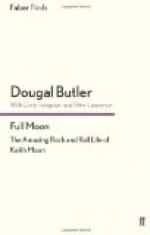“Because you could not succeed to the Turrald title if your brother’s daughter was legitimate.”
“That would not prevent my brother disposing of his property as he thought fit,” remarked Austin coldly.
“I am aware of that,” replied Mr. Brimsdown guardedly. He refrained from stating what was obvious to him, that Robert Turold had intended his fortune for the upkeep of the title when gained, and for no other purpose. “After all, it does not matter very much how long your brother was aware of the fact. The great point is—where are the proofs? I cannot understand why your brother did not send them on to me. I intend to make another and longer search among his papers at Flint House. They must be found. The House of Lords will require the most convincing proof on this head before terminating the abeyance in your favour.”
“If I proceed with the claim, you mean,” said Austin.
The lawyer turned on him a startled glance which had something of consternation in it. His own interest in the title, was, by force of long association with Robert Turold, so deep and intimate that it had never occurred to him to suppose that the younger brother might not share in the obsession of the elder.
“Titles are at a discount nowadays—like virtuous women,” proceeded Austin. “The most extraordinary people have them. Are you aware that there were nearly four thousand names in the last Royal bestowal of Orders of the British Empire? There’s kingly munificence for you! It’s the same with the Masonic order. The gentleman you address as ‘Right Worshipful Sir’ overnight delivers poultry and rabbits at your back door next morning. Democracy has come into its own, Brimsdown. Sooner or later we shall have a king wearing a cloth cap.”
“Your remarks do not apply to the old nobility,” returned Mr. Brimsdown austerely. “They will never become common. It would be a pity not to prosecute your brother’s claim to the Turrald title. He gave thirty years of his life to establishing the line of descent.”
“My brother had the temperament of a visionary,” replied Austin. “I am more practical. But I shall respect his wishes, if possible, though from what you say it would seem to be quite useless to go on with the claim if the missing proofs about his wife’s previous marriage are not recovered.”
“That is quite true,” Mr. Brimsdown admitted. “But I feel sure that they are in existence, somewhere. Your brother Robert was not the man to make a statement of that kind without the proofs. He knew the value of documentary evidence too well for that.”
“But so far the proof of his daughter’s illegitimacy rests on his unsupported statement, which would be quite valueless in a court of law?”
“That is so.”
“If these proofs are found, do you think that my chance of regaining the title is as good as Robert’s?” Austin asked. “Are the circumstances of his death likely to tell against my succeeding? I ask you because I know nothing about peerage law.”




